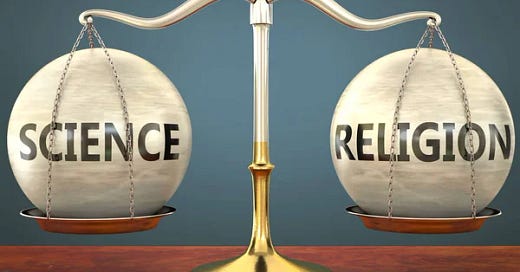The title of this article reverses an idea that often pops up in discussions about science and religion. An argument is sometimes made that “science proves God.” The reasoning goes that the more science discovers about the universe, the more it points toward the existence of something on par with “God”.
This isn’t a new idea. For example, the teleological argument (argument from design or intelligent design argument) originating with Socrates in ancient Greece, states that complex functionality in the natural world, which looks designed, is evidence of an intelligent creator.
There is also Aristotle’s “unmoved mover” argument, which states that there cannot be an infinite regression of cause and effect without any fixed starting point. Aristotle posited that God was the First Mover, who was able to set the universe in motion without any prior cause. Aristotle argued that God is eternal and exists outside the universe, which is how God could be the first or prime mover.
In more recent times with the advent of quantum physics (and the so-called “hard problem of consciousness”), religion contends that more evidence for God has been uncovered. It has been said by some that the reductionist or materialist view of the universe has been called into question with discoveries of “non-material” reality. To the ears of many religious people, this sounds like spiritual reality, which feels like the realm of “God”.
When it comes to whether science provides evidence of “God”, there’s quite a bit to sort out, including what one means by “God”. For example, are we discussing whether science proves the existence of the “God” of Christian theism - a supreme deity who created the universe and oversees its affairs? In my view, this is the least defensible view of God, which I discuss in my article, Is Christian Theism Dead? Given my issues with Christian theism, I do not count the traditional “teleological” or “prime mover” arguments for God to be credible.
If one shifts the context from science and Christianity, to science and Eastern spirituality, it’s a much different discussion. I previously published an article, Hindu philosophy as a useful deconstruction framework. In this piece I discuss why Eastern spirituality is appealing to people who have lost faith in Western religion. In my series, “Philosophers You’ve Never Heard Of” I devoted an article to covering the Buddha and Buddhism.
One could ask the question: Is the scientific explanation of the universe commiserate with the cosmology of Eastern spirituality? From my own exploration, I believe there is some meaningful compatibility. Though an intriguing investigation, it’s not the subject of today’s article. A few books you might have an interest in exploring related to this are:
Keep reading with a 7-day free trial
Subscribe to Deconstructionology with Jim Palmer to keep reading this post and get 7 days of free access to the full post archives.





